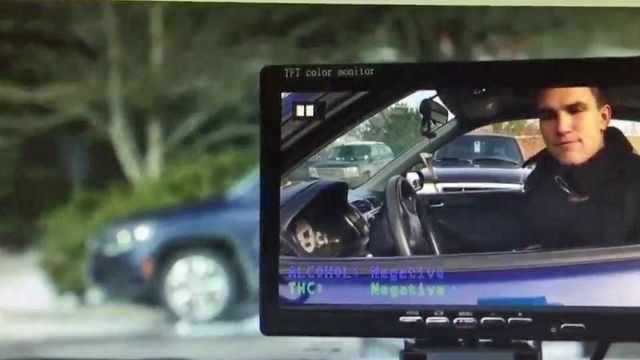Duke students think robot cop could make police stops safer
As violent encounters between police and the public continue to garner national attention, two Duke University students are trying to find ways to use technology to make policing safer.
Posted — UpdatedThey say their invention, a robot that handles traffic stops, can make interactions safer for law enforcement officials and the people they come in contact with.
Vaibhav Tadepalli, a senior, and Chris Reyes, a graduate student, say their invention, called Sentinel, represents a "better way" for law enforcement officials to do their job.
When Sentinel is complete, drivers will be able to interact with an officer through a video screen that is attached to a lift that rises as high as 7 feet in the air.
"Instead of me getting out of the car, the robot drives itself. It deploys from the car and drives itself over to his window," Reyes said.
Vaibhav said the interaction is similar to Skype.
"I'm looking at the screen, and I see Chris in the car behind me," he said. "He asks for my license and registration. I hold it up to the screen and it scans that."
The information goes directly into the officer's laptop. Sentinel also records video.
"It can record what's going on. It can start populating data, from what type of make and model the car is to its license plate," Reyes said.
The students say they believe Sentinel could help diffuse potentially volatile situations.
"We really hope that we won't read headlines that someone has been fatally shot at a traffic stop through no fault of their own, whether it's an officer, whether it's a motorist, that's really our goal," Vaibhav said.
The inventors repeatedly consult with law enforcement officials, and they even went on a ride-along with a police officer.
"I'm still really nervous, and she turned to me and said, 'Imagine how we must feel,'" Vaibhav said. "That really spoke to me."
Vaibhav said law enforcement officials they've spoken to have been supportive of the idea.
"They really think it can make a difference," he said.
The students say they hope that Sentinel will cost much less than other law enforcement robots, which in the past have cost up to $20,000. So far, Reyes and Vaibhav have invested about $1,500 in Sentinel.
They have also entered their invention in the Duke Start-Up Challenge and have already made it through one round of the competition. The winner will be announced in the summer.
• Credits
Copyright 2024 by Capitol Broadcasting Company. All rights reserved. This material may not be published, broadcast, rewritten or redistributed.





